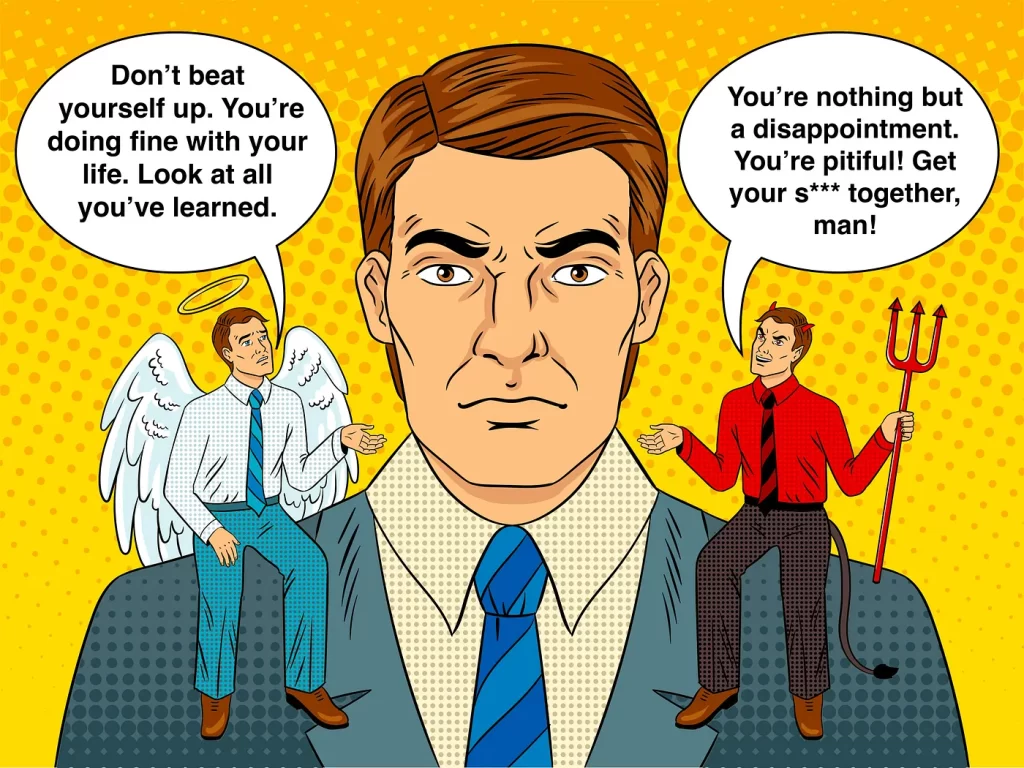The idea of being successful, and whether one is a success or failure, messes a lot of people up. It doesn’t have to be that way. Rethink what success is, create a flexible and flowing definition for yourself, change it as you need to, and never beat yourself up. Adobe stock: Photocreo Bednarek
Occasionally, I have conversations with my clients about what their definitions of success are. It usually comes up when they shame or beat themselves up about something they did or did not do.
“I failed at that job/marriage/situation.”
“I wasted my time in that relationship.”
“That was such a stupid decision I made.”
“I hate myself for doing that.”
“I’ve ruined my life.”
“If only I had …”
“I guess now it’s too late.”
“I had planned for X, but X didn’t happen.”
“I didn’t meet anyone’s expectations, even my own.”
As pained as they are by these ideas, it pains me also to hear them, and I consider when someone beats themselves up, it’s a 911 mental and emotional health emergency.
The voices in our head.
In my mind’s eye, I visualize each one of us as two people. There is the part of us that is living life, making decisions, and doing different things in whatever ways, and the part of us that is watching and speaking to ourselves about it, like a narrator. We might have several personality parts that speak to us at any given time, but the primary two are the voice of negativity and criticism and the positive, compassionate, caring voice. To me, when a person beats themself up with a negative voice, the other part of us winces and cringes in pain as if we are beating our own child, which, in a way, we are. I honestly believe this destroys human beings at the cellular level. Part of the art of life, and a great first step to getting healthy, is learning to quiet the negative chatter in your head.

The first order of business is to quiet that dark, critical voice in your head. Adobe stock: By Oleksandr Pokusai
The author of Power of Now, Eckhardt Tolle, a respected mind and spirit guru, explains how to quiet the negative voice, and I can attest to it being effective. He says, (1) Our thinking mind is primarily concerned with our past and future, and the way to overcome it is to 1. Recognize that it is self-talk in your head, and it is not you talking to yourself. 2. Become aware when the negative voice seeks your attention and call it out as the liar and joy-killer it is, and 3. Realize that you are causing suffering for yourself and those who care about you, all because of negative self-talk and stories you tell yourself in your head. 4. Ask yourself, am I the negative thoughts in my head, or am I the being that is observing the negative thoughts?
When humans become aware of that voice and those self-sabotaging thoughts and can recognize that the voice is just that, a voice trying to cause us suffering, we become aware, and over time, the voice shows up less often. It was Tolle’s book that taught me this concept long ago, and I began practicing it immediately. I now rarely hear the voice; it knows I’m on to it. New skills such as these are life-changing, and for most of my clients, it’s imperative that they learn them.
Broadening your perspective.
After a client and I talk about success and define what they believe it to be (their version may be challenged if it sets them up for future suffering), we will dissect the efficacy of the many ugly stories they tell about themselves to see if those negative judgments still hold true when we’re finished. It’s the only way to get them to see the bigger picture, that life is not black-and-white, and that conclusions or judgments made after going in whatever direction you choose are not just limited to two: I succeeded or I failed. To thrive in life, we must broaden our perspectives. Humans tell their stories, but that same story can be told in different ways with more positive meanings. If my client tells a story with them starring as the village idiot who has failed at almost every turn, I show them how to retell it factually where they were resilient, a survivor, a hero, or all of these and others. Try it — take a negative story you tell about yourself, try to see the good in it, and tell it in a way that casts you in a more positive light. I describe one of mine here …
Although I have been married four times and divorced three, after much weaving and bobbling over what it meant, I rested on the conclusion that I don’t consider those three marriages as failures. They were a crash course in learning about myself and what I value and believe in, and they helped me know what people and experiences are a fit for who I am. It has given me perspective: how can one appreciate the good without having experienced the bad? All of this deeper processing helps us eliminate suffering and brings peace, and that’s what we’re all looking for in the end, aren’t we? To me, if you learn about and accept yourself as you are and who you have been, then tweak your life to fit the present you on an ongoing basis, then that is another form of my own definition of success. Once you know more about yourself and what you enjoy, you get to reap the reward — designing a life that works for you.
If you beat yourself up …
… you are not on a healthy track …
… with yourself.
Younger selves may not be the best planners and rule-makers for our future older selves.
Think of it this way: people learn through experience, so we are green and untried when we start out life, and the idea that we can create a definitive plan to achieve long-term success for ourselves and hold to it, ensuring a certain outcome, based on all we still don’t know in life is ridiculous. Plus, who you are at 18, 25, 35, or 40 won’t be remotely who you are later in life. Trust me on this. We have to be flexible in our viewpoint and be able to do that bobbling and weaving to accommodate all the selves we will be throughout our lives. Sometimes, I picture the different selves I’ve had throughout life as racers in a track meet who pass the baton forward to the next … 25-year-old Becky had the baton until she handed it off to 32-year-old Becky, and on and on. It excites me when I realize I’ve finished one era in my life and am now going to pass the baton on to the next version of me. I’m in one of those moments now. I trust myself enough to know that as I move into this version of life, I can figure anything out and make adjustments along the way to keep myself healthy and content. I get to do life on my own terms; that is another version of success for me.
Every time we do anything, we are learning more about who we are. That’s why I always stop clients when they want to give me a list of their mistakes. “Mistakes?” I say. “There are no mistakes, only lessons learned.” Example: If I took guitar lessons because I thought I might like it and ended up hating it, that was not a mistake or a failure; it was information I needed to learn that guitar was not for me. At least, I will never regret having given it a shot. That is a healthy perspective and a success story. To beat me up for buying a guitar and taking lessons for three months, then dropping it, is not the positive mindset I want any of us to deploy. It is also why we should allow our children to try all the new things and different things that pique their interests; it’s how they will come to know who they are and what they love and don’t love.
So, life is like a classroom, and experiences are our teachers. If we set long-term goals early in life, that’s fine, but it’s a good idea to be flexible with ourselves over the years and allow ourselves to grow and shift courses as we mature and learn more and more. If you have ever used the voice navigation in your vehicle, then you know that when you miss a turn or just want to go somewhere else, the voice guiding you doesn’t flip out, scold you, or tell you you’re an idiot, it just says “rerouting,” and finds you another way of getting back on the path. A healthy emotional life is the same way; we must be aware that things will happen along the way that can’t possibly be predicted and allow space to go with the flow of that without expending negative energy on the shifts and redirects that will inevitably happen. Your job is to pay attention and learn from your personal experience, then weed out what doesn’t work for you, add the things that do, and keep learning and moving to the next step of your life.
Though people may try to hold themselves to ridiculously strict guidelines and timeframes, what control freak or perfectionist doesn’t, it is not a winning plan for emotional health. In doing that, we set ourselves up for self-abuse, which is never okay. To reach an ultimate goal, whatever that is for you, there will be bends and turns; other people will figure into the equation and influence you, and you may want to change and adjust what that goal is along the way. That is not failure; that is smart.
Although Webster’s Dictionary defines the idea of success as a favorable outcome, I like to think the idea of success means different things to different people. There is a shallow version that includes vanity and ego-based things, like materialism, social status, physical beauty, a fat bank account, and the appearance of success, which is somewhat like building a house on sand, and there are other more solid things like having peace, freedom, options, contentment, and being with people who love you and whom you love. For me, my measure of success has been forming a healthy relationship with myself, having the confidence to try or go for anything I choose, and having the freedom to be myself authentically, regardless of other’s opinions. I also want to make a difference. It took decades of work to achieve that, and it’s my greatest success primarily because it has brought me peace of mind.
In all of this, I’m not saying we should not strive for financial stability or want to be a financial success. If your well-being or sense of self depends on having a certain amount of money or career success, though, then that’s a problem. In 1929, people whose identity was based on how much money they had jumped out of skyscrapers when the stock market crashed. Is it not obvious that that is an unhealthy stance? If they could have gotten back on the path, figured out how to survive, and be okay with the new version of themself that had little or no money, then I would have considered that a success.
People’s relationship with money is a subject for a whole different blog, but the one good thing money does for us is that it gives us options and provides freedom to make choices for ourselves. I like that.
How being flexible with yourself works in real-time.
It might be helpful to relook at whatever stories you tell about yourself with zero judgment. Mute the narrator in your head for a moment, and if it’s safe for you emotionally, watch yourself experiencing some of the negative things you tell about yourself. Sit quietly and tell yourself, “These things happened. It was educational; I learned and grew. And the things I learned about myself are 1, 2, and 3.” Then, send yourself some love and kindness, turn the movie off, and think of something else.
Too many people get mired in the ego-based ideas that success is related to performance, achievement, income, appearance, education, and meeting their personal goals at the very landmarks they had planned for themselves … married by 30, $150,000 a year by 35 … you mean you aren’t a millionaire at age 40 like you promised yourself when you were 17? Shame! What a failure. No, you are not.
People find endless ways of making themselves miserable when it comes to the subject of success or, really, anything else. Using the negative voice, they compare themselves to friends the same age who are further down that track or have similar training and education, and the critical voice in their heads leans in and steals their attention. The nasty, shaming judge we all know so well speaks with venom as it assesses effort and judges where we are in our attempts to live our best life. That voice only sees where we fall short in its view and lacks any compassion, understanding, or intelligence about how to process our life experiences.
Ralph was 54 and told a story about himself, saying that he was the one child in his family who failed to meet his father’s expectations. “I guess I’m the black sheep of the family,” he said, looking down at the floor.
“My dad wanted us to all become farmers like he was; the end goal was he was going to leave us his land one day, and we could carry on the family legacy,” he said. “But I was stubborn and wanted to make my own way. I really didn’t enjoy all the things involved in farming, anyway, all that hard work in the extreme weather, day after day. My two brothers stayed in our small town and began working alongside Dad like he wanted. I wanted to go to college, and I did. I eventually became a dentist and moved to another part of the country when I found the right opportunity. I needed to be away from there, where I wasn’t my dad’s son, where I could be me, but Dad just said I was ashamed of them like I was too good for them. Like, ‘What kind of son would do that,’ he said. My dad couldn’t understand why I didn’t want to stay and why I’d take a different career path, and I guess I really disappointed him. The family distanced themselves from me after that, and it’s like I didn’t fit in anymore.”
Ralph’s story about following his own passion instead of meeting his family’s expectations is a story of great success, at least in my view, although the way he tells it is full of self-blame. It took courage to step outside the family’s expectations and create a life where he was independent and was able to do what he loved. I told him so and also told him I’d had many a client who had chosen a path similar to his brothers, going along with their family’s plan, even though it wasn’t really what they wanted to do, and they were miserable, felt controlled, and trapped.
Anytime we aren’t true to ourselves when we throw ourselves under the bus so others can be happy, we will suffer. I wanted Ralph to know that it was he who made the healthy choice and that it was his family who were out of bounds, giving him a hard time with their harsh opinions about him finding his own way. The most successful people and families mentally and emotionally allow their children the space to figure out who they are and honor their choices and decisions.
What is success to you?
After considering all of this, what is true success to you? I hope you will scan your life where you are today, see all the successes in your personal life that got you to where you are, and learn to rewrite the negative stories you tell about yourself to reveal a courageous, motivated person who takes precious care of themselves and has made some positive impact in this life; however, that may be. Leaving the world better than you found it is a great starting point for success.
I asked my son once why he had joined the United States Marines. I have been a pacifist my whole life; no one in my family had ever served in the military, and it was difficult for me to understand. He said, “If I serve in the Marines, I can know that no matter what else happens in my life, I will have made a difference.” That was how my precious boy defined success. He was killed in 2011 at age 24 in Afghanistan, breaking many hearts, but those words comfort me today. And so, what is your definition of success?
(1) https://youtu.be/-HffrwmOT6c?si=Q9BjKvEC9dryMSwl
Becky Whetstone, Ph.D., is a licensed Marriage and Family Therapist in Arkansas and Texas* and is known as America’s Marriage Crisis Manager®. She is a former features writer and columnist for the San Antonio Express-News and has worked with thousands of couples to save their marriages. She can work with you, too, as a life coach if you’re not in Texas or Arkansas. She is also co-host of the Call Your Mother Relationship Show on YouTube and has a telehealth private practice as a therapist and life coach via Zoom. To contact her, check out www.DoctorBecky.com and www.MarriageCrisisManager.com. Also, here is how to find her work on Huffington Post. Don’t forget to follow her on Medium so you don’t miss a thing!
For licensure verification, find Becky Whetstone Cheairs.










 Becky Whetstone is an Arkansas native and has a Ph.D. in Marriage and Family Therapy from St. Mary’s University in San Antonio, Texas. She is a Licensed Marriage and Family Therapist (LMFT) in Texas and Arkansas.
Becky Whetstone is an Arkansas native and has a Ph.D. in Marriage and Family Therapy from St. Mary’s University in San Antonio, Texas. She is a Licensed Marriage and Family Therapist (LMFT) in Texas and Arkansas. 





















































































































